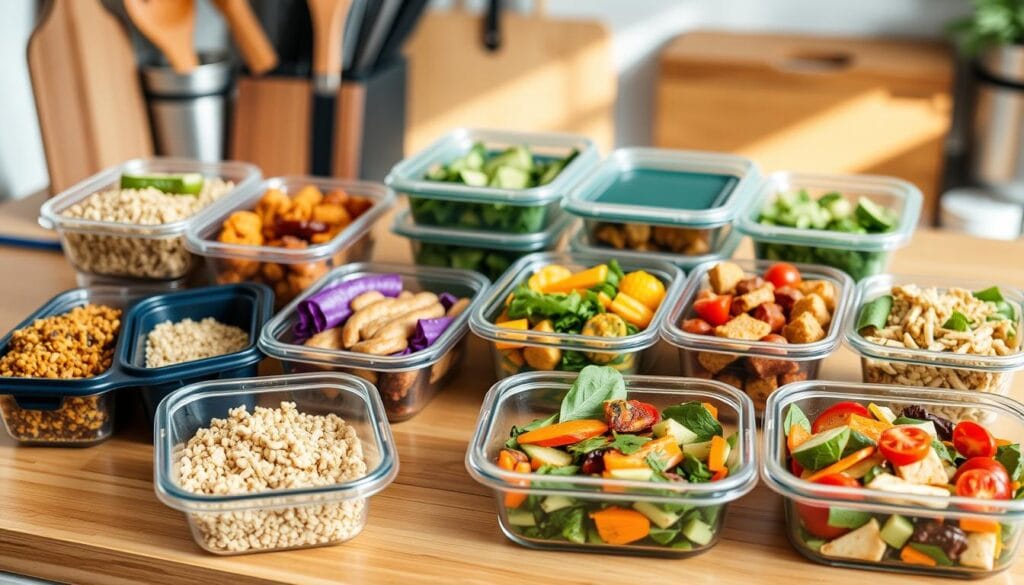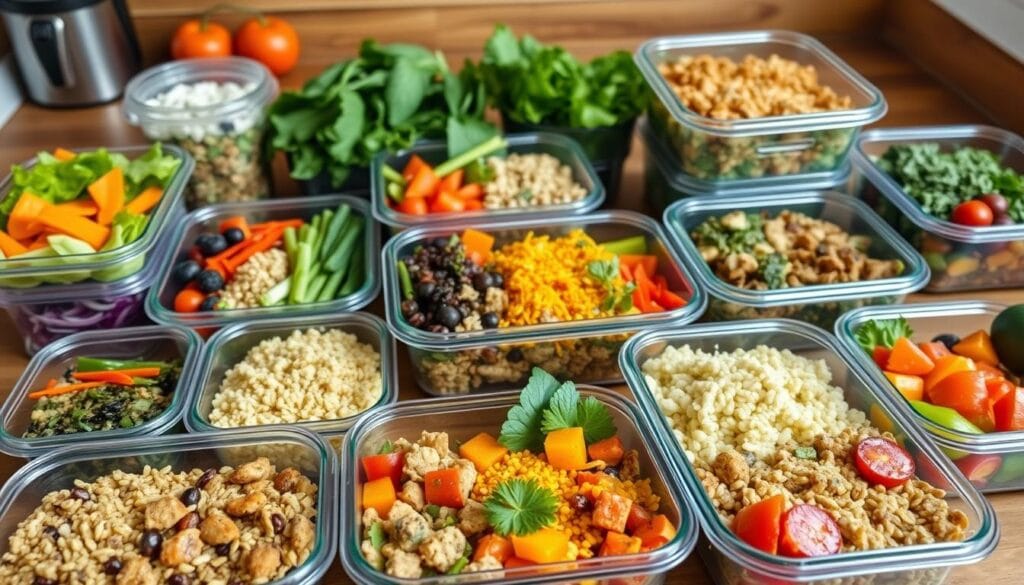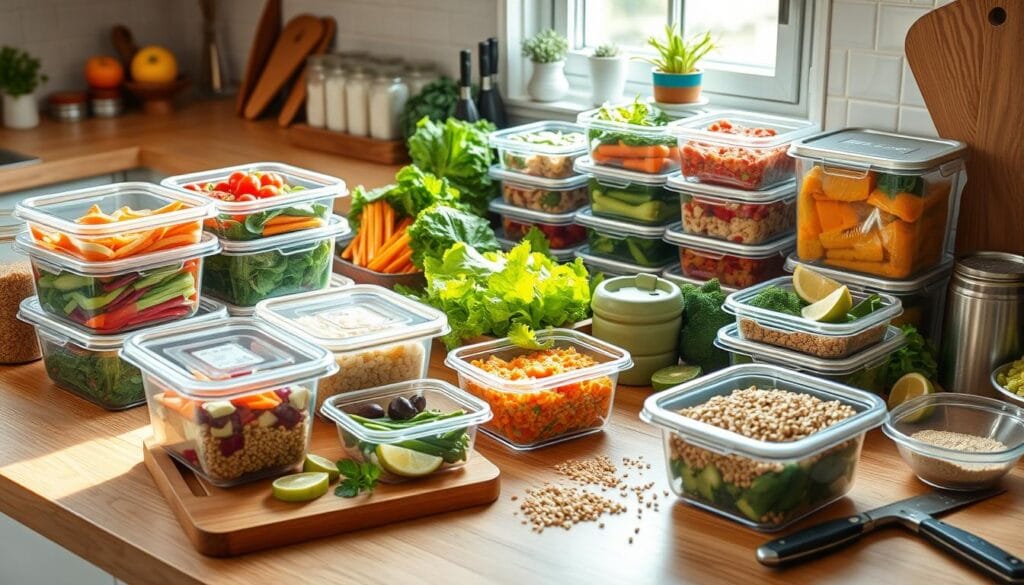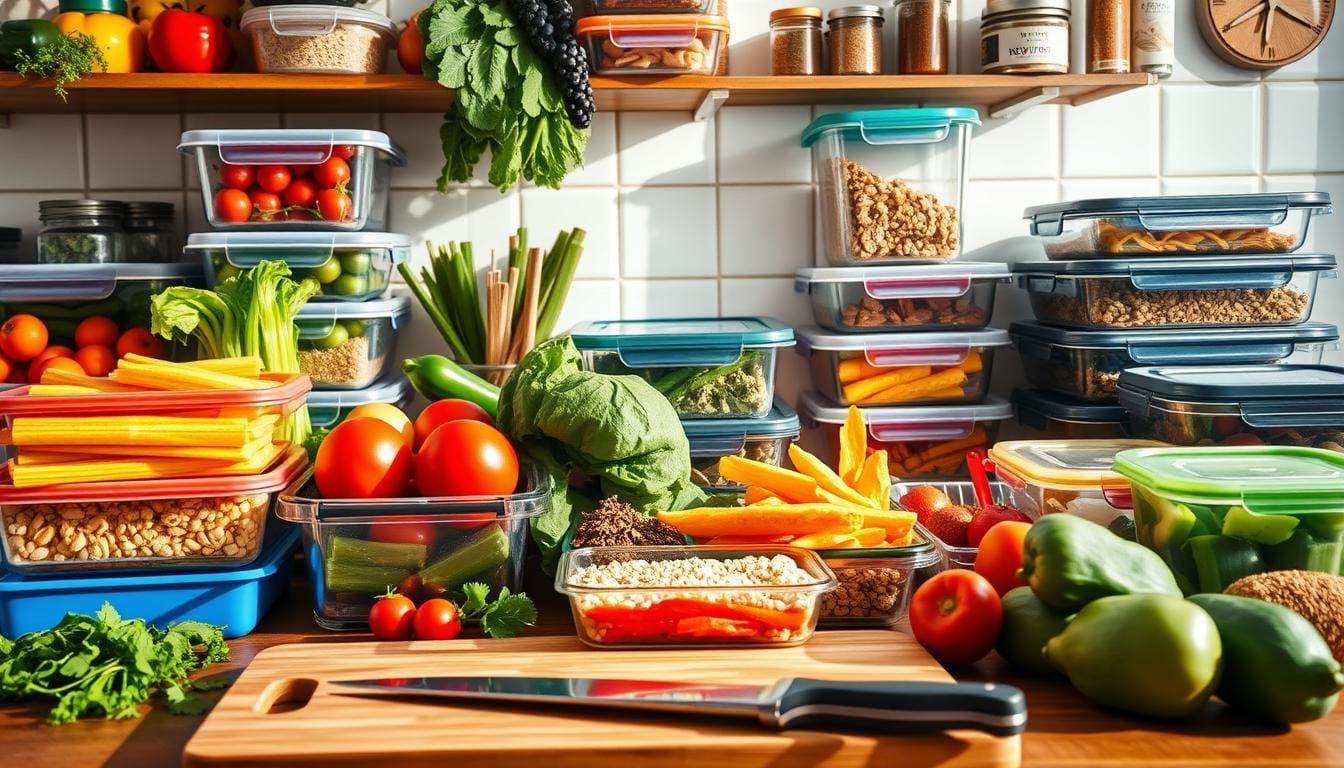Ever find yourself staring into the fridge at 7 PM, wondering what to cook? You’re not alone. Almost half of us struggle to eat healthy, as the week goes on. Meal prep is your secret to better nutrition and more free time.
Imagine having healthy meals ready in your kitchen. Meal prep isn’t just about saving time. It’s about living a healthier lifestyle. With simple strategies, you can cut cooking time by hours and save on groceries.
Meal planning is more than just cooking. It’s about making choices that are good for your body and simplify your life. By spending a few hours each week on prep, you’ll make better food choices and eat more balanced.
Table of contents
Understanding the Basics of Meal Prep
Meal prep is a great way to eat healthier and make your nutrition routine easier. For those new to meal prep, learning the basics can change how you cook and eat.
Healthy meal prep is more than just cooking ahead. It’s a full approach to nutrition that can really improve your eating habits. Studies show that people who plan and prep meals tend to make better choices and stick to their diet.
Why Meal Prep is Essential for Healthy Eating
Meal prep has many benefits for a healthier lifestyle:
- Reduces daily stress around meal decisions
- Helps control portion sizes
- Minimizes impulse eating
- Saves time during busy weekdays
- Supports consistent nutrition
“Meal prep is not about perfection, but about progress in your nutrition journey.”
Common Misconceptions About Meal Prep
Many people are hesitant to start meal prep because of myths. Let’s clear up some common misconceptions for beginners:
| Myth | Reality |
|---|---|
| Meal prep is time-consuming | With practice, you can prep 4-6 recipes in just 1-2 hours |
| Prepared meals are boring | You can create diverse, flavorful meals with proper planning |
| Meal prep is expensive | It can actually reduce grocery bills by 25-50% |
Pro tip for meal prep beginners: Start small. Begin by prepping 2-3 meals per week and gradually increase as you become more comfortable with the process.
Setting Goals for Your Meal Prep
Starting a meal prep journey needs clear goals and planning. Your nutrition goals guide your healthy meal prep. They help change your eating habits and improve your health.
Good meal planning starts with knowing your health goals. You might want to lose weight, build muscle, or eat better. Setting your goals is key.
Defining Your Nutrition Goals
When setting nutrition goals, think about these:
- Identify your specific health targets
- Assess your current dietary habits
- Calculate your recommended calorie intake
- Determine macronutrient balance
“Start with planning and preparing just one meal time in advance. For instance, meal prep only lunch,” recommends nutrition expert Erin Palinski-Wade, RD.
Planning for Different Diets
Healthy meal prep fits many diets. Here’s a quick guide for different diets:
| Diet Type | Key Considerations | Meal Prep Strategy |
|---|---|---|
| Weight Loss | Calorie deficit | Portion-controlled meals |
| Muscle Gain | High protein intake | Protein-rich meal preparations |
| Vegetarian | Plant-based protein sources | Diverse legume and tofu recipes |
| Ketogenic | Low carb, high fat | Carefully measured macronutrients |
Studies show that 93% of people who meal prep see health benefits. By setting clear goals and planning well, you’ll improve your nutrition and lifestyle.
Essential Kitchen Tools for Meal Prep
Having the right kitchen equipment is key for meal prep success. Choose tools that make cooking and storing food easy and convenient. The right gadgets can turn meal prep into a fun activity.
Investing in quality kitchen tools is essential for efficient meal prep. Here are some must-have gadgets to improve your meal prep:
Top Kitchen Gadgets for Efficient Meal Prep
- Food Processor: The Breville Sous Chef 16 Pro is the top pick among 10 units
- Slow Cooker: Cuisinart Cook Central Multi-Cooker is a standout performer
- Electric Pressure Cooker: Chef iQ Smart Cooker cooks food fast
- Digital Kitchen Scale: Crucial for accurate portioning
- Chef’s Knife Set: Victorinox Swiss Classic is versatile and affordable
Choosing the Right Meal Prep Containers
“I suggest picking containers that are microwave-safe for hot lunches,” advises nutrition expert Sarah Homan.
When picking meal prep containers, keep these points in mind:
- Durability: Go for containers that last through many uses
- Versatility: Choose containers safe for microwave, dishwasher, and freezer
- Size and Stackability: Rubbermaid Easy Find Lids come in a 42-piece set for easy storage
- Material: Look for BPA-free, leak-proof options
Your meal prep containers should help you reach your nutrition goals. They should also make food storage easy. The right tools can save you time, reduce stress, and help you stay healthy.
Creating a Meal Prep Schedule
Creating a meal prep routine can change your eating habits and save you time and money. It’s all about planning well to fit it into your life.
Choosing the right days for meal prep is key to staying on track. While many pick Sundays and Wednesdays, the best day is up to you. It should match your schedule and energy.
Finding the Best Days to Prep
When picking your meal prep day, keep these tips in mind:
- Look at your weekly schedule
- Choose a day with few other plans
- Go for a day when you have lots of energy
- Try to keep it the same every week
“Planning is bringing the future into the present so you can do something about it now.” – Alan Lakein
Timing and Efficiency Tips
Here are ways to make your meal prep more efficient:
- Set aside 2-3 hours for meal prep
- Use batch cooking to save time
- Get good storage containers
- Prep ingredients ahead of time
Studies show that meal preppers can save up to $10,000 a year and cut cooking time by half. A well-planned meal prep routine can save you time and money.
Remember, the key to good meal prep is finding a rhythm that fits you. Start small, be patient, and adjust as you go.
Selecting Ingredients Wisely
Starting healthy meal prep with the right ingredients is key. Your shopping list can greatly impact your meals all week.
When planning meals, aim for a balanced mix of ingredients. Smart choices save time, cut down on waste, and boost nutrition.
Choosing Fresh Produce
Fresh fruits and veggies are the heart of healthy meals. Here’s how to pick the best:
- Choose seasonal produce for the best taste and health benefits
- Pick veggies that last longer, like carrots, broccoli, and bell peppers
- Go for pre-cut veggies to save time
Incorporating Whole Grains and Proteins
Choosing the right grains and proteins is vital for balanced meals. Here are some smart picks:
| Category | Recommended Options | Prep Time |
|---|---|---|
| Whole Grains | Quinoa, Brown Rice, Barley | 15-30 minutes |
| Proteins | Chicken, Tofu, Canned Beans | 10-20 minutes |
“You don’t have to make everything from scratch,” says nutrition expert Sarah Thompson. “Rotisserie chicken, tuna packets, and pre-cut vegetable trays can significantly cut down on meal prep time.”
Efficient meal prep is about making choices that fit your life. Start small, try new ingredients, and find what works for you.
Meal Prep Recipes for Beginners
Starting with meal prep recipes is easy. It can change your weekly meals, saving time, money, and stress. It’s all about planning and choosing tasty, healthy meals.

Most recipes take just 30 minutes to make. This is great for those with busy lives. A 1-hour meal prep plan can save you up to $10,000 a year on food.
Simple Breakfast Ideas
Begin your day with these quick, healthy breakfasts:
- Overnight Oats: Versatile and customizable
- Meal Prep Breakfast Burritos: Freezer-friendly for up to 3 months
- Smoothie Packs: Add spinach for an extra nutrient boost
Quick Lunch and Dinner Options
Efficient meal prep recipes make lunch and dinner easy:
| Recipe | Prep Time | Calories |
|---|---|---|
| Coconut Mango Chicken Bowls | 25 minutes | 350-400 |
| One-Pot Pasta Primavera | 30 minutes | 400-450 |
| Sheet-Pan Garlicky Shrimp & Veggies | 20 minutes | 300-350 |
Healthy Snack Preparations
Snacks keep your energy up. Choose ones with 250-300 calories that are filling and healthy.
“Meal prepping isn’t about perfection; it’s about progress and making healthier choices easier.”
With these easy meal prep recipes, you’ll cook faster, waste less food, and enjoy home-cooked meals all week.
Building a Balanced Meal Plan
Creating a balanced meal plan is key for healthy meal prep. Studies show that meal planners eat a wider variety of foods. This is the first step in your nutrition journey.
Understanding Macronutrients
Macronutrients are the base of any good meal plan. They include three main parts:
- Proteins: Important for muscle repair and growth
- Carbohydrates: Give energy for daily tasks
- Fats: Help with hormone production and nutrient absorption
“Make meals satisfying by including a balance of protein, produce and complex carbohydrates,” nutrition experts recommend.
Portion Control Tips
Learning portion control is essential for healthy meal prep. Here are some tips to manage your meal sizes:
- Use smaller plates to naturally reduce portion sizes
- Measure ingredients before cooking
- Practice the half-plate rule: fill half your plate with vegetables
- Invest in portion-controlled containers
Using these strategies helps keep your meals balanced and prevents overeating. With regular practice, meal planning gets easier and more natural.
Incorporating Variety in Your Meal Prep
Keeping your meal prep exciting and diverse is key to maintaining a sustainable healthy eating routine. By exploring different flavor profiles and seasonal ingredients, you can transform your meal prep recipes from mundane to extraordinary.

Exploring flavor profiles isn’t just about taste—it’s about keeping your meals interesting and nutritionally balanced. Here are some meal prep tips to add excitement to your weekly menu:
- Experiment with global cuisines
- Use different spice blends
- Rotate protein sources
- Incorporate seasonal produce
Exploring Flavor Profiles
Your meal prep recipes can become culinary adventures by understanding flavor combinations. Think Mediterranean one week, Asian-inspired the next. This approach prevents palate fatigue and ensures you’re getting diverse nutrients.
“Variety is the spice of life—and meal prep!”
Seasonal Meal Ideas
Seasonal ingredients not only taste better but are often more affordable. MyPlate recommends incorporating all five food groups while embracing what’s fresh:
- Spring: Asparagus, strawberries, peas
- Summer: Tomatoes, zucchini, berries
- Fall: Squash, apples, brussels sprouts
- Winter: Citrus, root vegetables, kale
By rotating ingredients and flavors, you’ll keep your meal prep exciting and nutritionally diverse. Remember, the goal is to create meals you look forward to eating!
Staying Motivated with Meal Prep
Keeping up with meal prep can be tough, but it’s doable. It’s not just about eating healthy; it’s about enjoying the process. Meal prep can be fun and fulfilling, even for beginners.
To stay on track with meal prep, you need creativity and smart tips. Let’s look at some ways to keep your meal prep journey exciting and rewarding.
Creating a Personal Reward System
Having a reward system can make meal prep more enjoyable. Here are some ideas to keep you motivated:
- Keep a journal to track your meal prep wins
- Set weekly goals and celebrate when you hit them
- Buy new cooking tools or containers to get excited
- Treat yourself to something special after a successful week
“The key to successful meal prep is making it enjoyable, not a punishment.” – Nutrition Expert
Joining Meal Prep Communities
Connecting with others can really help you stay motivated. Meal prep tips from others can inspire and support you:
- Look for online meal prep forums and social media groups
- Share your journey and learn from others
- Join virtual meal prep challenges
- Swap recipe ideas and tips
People who join meal prep communities are 40% more likely to keep up with meal prep. Finding your community can keep you motivated and inspired on your healthy eating path.
Remember, meal prep is about making progress, not being perfect. Start small, be gentle with yourself, and enjoy making healthy, tasty meals that help you reach your health goals.
Adapting Meal Prep for Special Diets
Healthy meal prep for special diets is easy. You can make meal prep recipes for vegan, vegetarian, or gluten-free diets. This way, you meet your nutritional needs.

Dietary restrictions don’t have to stop your meal prep creativity. You can make tasty and healthy meals that fit your health goals.
Vegan and Vegetarian Meal Prep
Plant-based meal prep needs careful planning for balanced nutrition. Here are some protein-rich options for your meal prep:
- Legumes like lentils and chickpeas
- Tofu and tempeh
- Quinoa and other complete protein grains
- Nutritional yeast for B-vitamin supplementation
Gluten-Free Meal Prep Options
Gluten-free meal prep can be fun and healthy. Use naturally gluten-free grains and ingredients for varied, tasty meals.
| Protein Source | Grain Alternative | Vegetable Options |
|---|---|---|
| Grilled chicken | Quinoa | Roasted sweet potatoes |
| Tofu | Brown rice | Steamed broccoli |
| Black beans | Cauliflower rice | Sautéed zucchini |
“Meal prep is about nourishing your body while respecting your dietary choices.” – Nutrition Expert
About 70% of people who meal prep feel more in control of their diet. By adjusting your meal prep for special diets, you can enjoy tasty meals that fit your nutritional needs.
Pro Tip: Always check ingredient labels and consult with a nutritionist to ensure your meal prep meets your specific dietary requirements.
Troubleshooting Common Meal Prep Challenges
Meal prep can feel overwhelming, with over 60% of people stressed about weekly food prep. But, it doesn’t have to be hard. Smart meal prep hacks can make your cooking easier and help you beat common meal prep hurdles.
Food waste is a big problem, with about 30% of prepped meals thrown away. To cut down on waste, freeze extra food and use ingredients in different recipes. Tips like batch cooking and choosing ingredients wisely can help you use more of your food and save money.
Dealing with Food Waste
Freezing is the best way to deal with extra food. Label containers with dates and what’s inside to keep track of freshness. Divide big batches into smaller portions to fit in your fridge and make meals easier to manage.For more great recipes please click here.
Being flexible is key to avoiding waste and keeping your meals interesting. It helps you enjoy a variety of dishes without getting bored.
Adjusting Recipes for Taste Preferences
Taste fatigue hits nearly 70% of meal preppers, making them tired of the same old meals. To avoid this, try new spices, marinades, and cooking methods. Get a wide range of spices and learn how to season food to make simple ingredients exciting.

